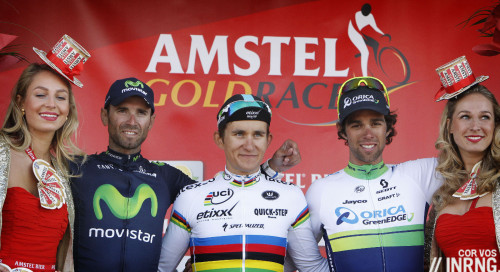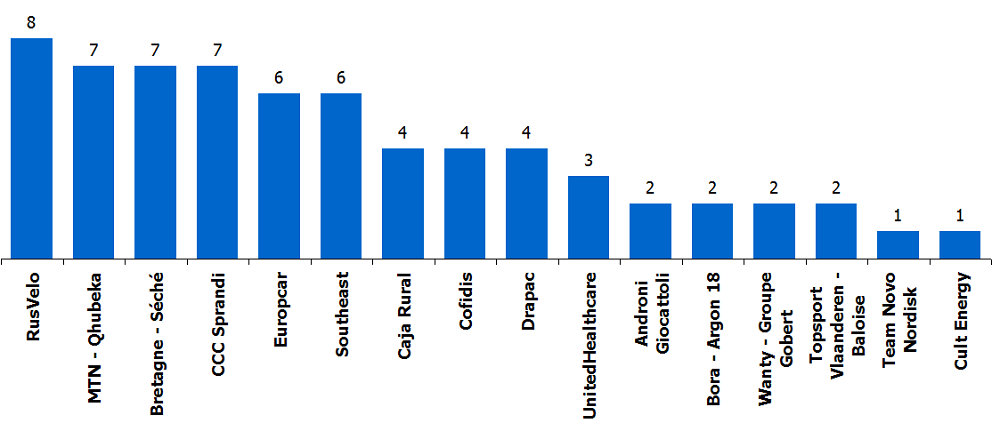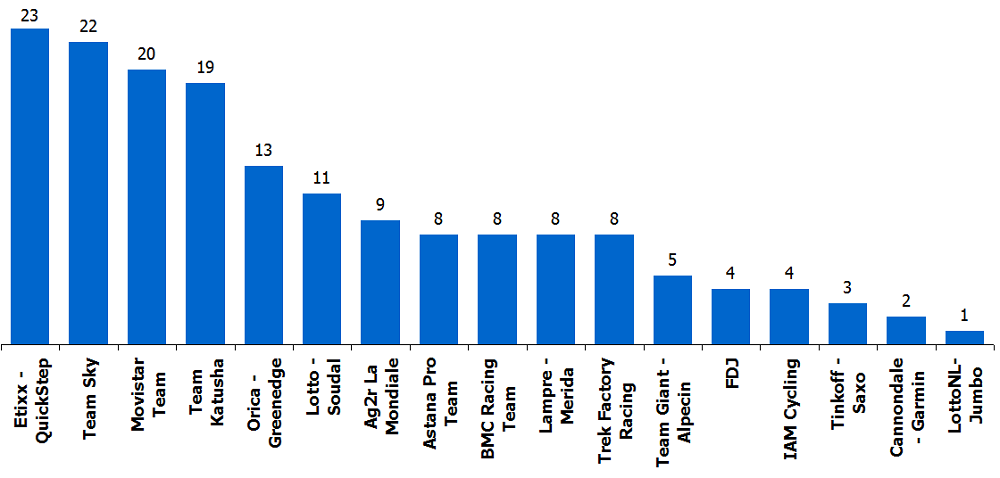With the Giro starting tomorrow a quick chance to check the lie of the land across all teams with the victory rankings. After the busy month of April we’re now one third of the way through the season as measured by race days.
It’s interesting that one big theme of April was how Etixx-Quick Step couldn’t win a race but here they are at the top of the table, boosted by Mark Cavendish’s Turkish triple last week. He is on nine wins, as is Team Sky’s Richie Porte while the top spot belongs to Alexander Kristoff with 11 wins.

The top four teams have half the wins and there’s a reasonable correlation between budget and results. Not that all team budgets are known but with some estimation the correction is there. Tinkoff-Saxo have a large budget but it’s not at BMC, Sky or Etixx-Quick Step levels, but it is bringing few results. Still if Alberto Contador does the Giro-Tour double then the chart about becomes meaningless.
Lower down and Giant-Alpecin have quality over quantity. Sanremo and Roubaix are great results but normally the team would have won more with Marcel Kittel, Luza Mezgec for the sprints. Kittel is struggling with his return but he’s been on a level above others before and has time to start racking up the wins.
Cannondale-Garmin and Lotto-Jumbo well at the bottom, the US team is second last above but last on the UCI’s World Tour points ranking with the sum total across all riders of 26 points, just less than the individual haul of Davide Cimolai who sits 58th on the individual rankings.
As ever the repetitive mention that wins alone don’t count, teams long for high profile success rather than picking off wins in a 2.1 stage race, like Cannondale-Garmin did on a morning split stage in the Criterium International, great to win a race but few saw it happen. The point is that morale takes a hit, teams unable to win even the smaller races risk a psychosis and the vicious circle of few wins meaning more pressure, more nerves and so less success.

Now for the Pro Conti rankings where the combined total for the top three teams is less than that of the first team in the World Tour, illustrative of the slimmer pickings. Rusvelo lead but can you name a win? It goes to the point made about Ilnur Zakarin the other day, that Russian riders are foreign commodities who seem to operate in a silo that few look into. All the team’s win come in domestic races like the GP Adygeya and GP Sochi.

CCC-Sprandi and Drapac both share Pro Conti status but a World Tour win thanks to Maciej Paterski in Catalonia and Wouter Wippert in the Tour Down Under.
Thomas Voeckler explained to L’Equipe the other day just how tough things are for the Europcar team, there’s no new sponsor and the team’s finances are so tight they can’t afford many training camps, use budget hotels all the time and often won’t send a full fleet of vehicles to a race in order to save on fuel and tolls. A team sponsored by a vehicle rental firm can’t afford to run vehicles.
Cofidis meanwhile have a bigger World Tour budget but still have few results to show. Nacer Bouhanni spent the spring chasing big results but had to refocus on smaller goals to finally land three wins in domestic French races. Swedish sprinter Jonas Ahlstrand has just won the biggest race of the year, a stage in the Four Days of Dunkirk. Ahlstrand was hired as a lead out for Bouhanni but the teamwork hasn’t clicked and management have gone public with criticism of the Swede.
Onto the Giro where wildcard invitees will win stages to prove the Pro Conti teams can mix with the World Tour and where Oleg Tinkov will be hoping for that fourth win soon.


What LottoNL wouldn’t give for Dutchman Wouter Wippert’s 3 wins to be added to their dismal total.
Another interesting read, as always.
Topsport Vlaanderen with only 2 wins, but when one of those is Dwars Door Vlaanderen, you can only admit that the Topsport Vlaanderen project continues to be a great success!
Further E.Theuns is leading the UCI Europe standings and has a number of nice podiums
Have to agree, great team of young riders.
I didn’t like Ahlstrand’s movements yesterday. First he bunny-hopped over the central sidewalk in order to position himself (witty and well-executed, but overly dangerous in a sport that’s constantly talking about rider health), second he sprinted in diagonal, forcing Coquard into riding more distance than him and hence losing the sprint. Not very fair play.
It was wild but the whole finish was with crazy corners, the central divider and then a downhill run to the line. Amazing nobody crashed.
An awful lot of riders sprint like that – Cavendish, for instance.
I thought the finish was tremendously exciting: chaotic and dicey, yes, but do you really want to make the sprints formulaic and dull? Ahlstrand’s move was dodgy, but he only really put himself at risk.
If one wins by putting himself at risk, his rivals will have to do the same next time…
Exactly right. That’s why we should neutralize all descents. Some riders take more risks racing downhill to go for a stage win or a GC advantage. That puts other riders in the position of deciding whether to take more risks or give away the stage win or time on GC. That’s unfair! Risk takers cannot be allowed advantages! Safety first!
In terms of money investment, Tinkoff is the biggest looser. And he doesn’t like to be qualify a looser.
Katusha is the biggest surprise. At the end of the races they have 3 or 4 guys in the leading bunch. They, punch, they climb at the front, they’re everywhere and they win big races. Big improvement from last year. Maybe a little too much.
Katusha…their seasonal palmares is so good its almost glowing
Have you considered looking at Pro Cycling Stats’ seasonal team rankings instead of win count? While it largely corresponds to wins, it seems to more accurately represent overall team performance. Your win count analysis often seems to spend more time explaining why wins are a less-than-stellar metric, rather than analyzing team performance (which I assume is the point of the analysis?).
For example, Tinkoff’s boys look far more sound in the PCS rankings, but surely still a disappointment for their patron. Check out MTN-Q: their classics season feels like a massive disappointment with their depth of talent, and one might be tempted to question the fastman-heavy lineup, but PCS suggests that they’ve been there when it counts. I’d love to see them score big at the Tour, when it most certainly counts.
Poor JV though. No matter how you look at it, argyle hasn’t proved popular at the finish.
For quick reference:
http://www.procyclingstats.com/rankings/PCS_Season_Ranking_2015_05_07_Teams
I welcome rankings based on points, PCS, CQ and the UCI score are interesting and informative but ultimately they are exercises in arithmetic too. Here is the pure win rate, no accumulating points by finishing 8th without anyone remembering.
The latter could be considered “the Haimar Zubeldia method”.
The Russian teams certainly aren’t setting the world alight in Moscow this week. 6 of 7 days racing and Kolss from Ukraine have taken 3 wins and one for Minsk Cycling Club. There will be some unhappy people at the Victory Day parade tomorrow.
Novo-Nordisk won! is that their first ever?
Yes, the Stage 2 of the 2.2-rated Tour de Filipinas.
“A team sponsored by a vehicle rental firm can’t afford to run vehicles.”
This sums up the financial state of a lot of the pro cycling world so well. It will always escape me how a team with riders as popular and relatively succesful as Voeckler, Rolland and Coquard (and more) cannot attract a decent sized sponsor and stable budget. Just staggering to me!
LottoNL are really struggling themselves with a reduced budget and far too many injuries and crashes in much the same way as Cannondale-Garmin. These two teams have taken real tumbles down the rankings this year after major sponsor changes. Hopefully both can find fortune in AToC with Gesink, Tendam and Talansky, Dombrowski respectively because the Giro doesn’t look too good for either (with possibly the exception of Hofland for LottoNL).
Well look at HTC’s inability to get a sponsor despite having Mark Cavendish at the height of his powers. That one still mystifies me.
As with many sports there seems to be a danger that we end up witha top tier that are well funded, achieve success , which then attracts funding and talent, which continues to reinforce their position. Then it becomes difficult for other teams to either attract funding to invest to achieve performance to break through, or to hold onto talent that would. It needs to be addressed, not just in cycling. No, I don’t have too many ideas, F1 have tried to reduce costs to level the field and that has not really worked. Salary caps in some football codes, draft picks etc are other models that are used to create equality. I’ll think about when riding today…..
For a fully functioning financial sports model that works and creates equitable teams – see the US National Football League.
One of the key items is that TV contracts are negotiated for all events – in other words if you want to show the TDF, you also have to buy the rights for rest of the World Tour Events. All the teams share in the TV revenue. There is also a salary cap for teams.
I don’t dispute that it is expensive to put on the TDF – but the french Tourism benefit is huge….. Getting to host the superbowl is huge….
A smaller sport equivalent….
Who hasn’t heard of Kitzbuehl…etc.
Anyway nothing new…. this topic is not going away…and is not a sustainable model to rely on a few nouveau rich …. on ego trips…. spending their yearly allowances + more.
I think team points rather than wins a much more accurate and useful indicator of teams success.
Second at p-r is worth more than a first at the criterium international
A salary cap is definitely worth consideration I would have said. That way you might get a greater spread of riders competing for wins, especially in the classics. For example instead of Ettix having riders like van Kersbaulk and Trentin as domestiques they could be leaders for other teams. Plus it would prevent teams having too many leaders and major stars not even starting big races. Kwiatkowski and Gilbert (maybe not quite anymore) are both capable of winning Flanders but neither started. There are far too many big riders kept on the leash working for others (Sky) when they are good enough to fight for themselves. I know you need domestiques, but you don’t want major talents performing the role.
Not sure how a salary cap would work. They still can’t get something like the bio-passport or cortisol levels right, so in not sure how they’d think they could measure funding across 20-odd athletes who are all based in different financial jurisdictions etc.
Keeping tabs on it all would seem to be beyond the capabilities of the UCI at this time…
Blood bags to be replaced by brown paper bags??